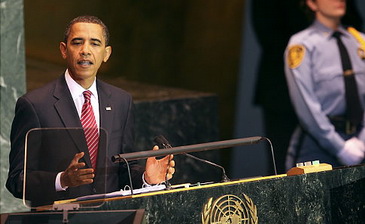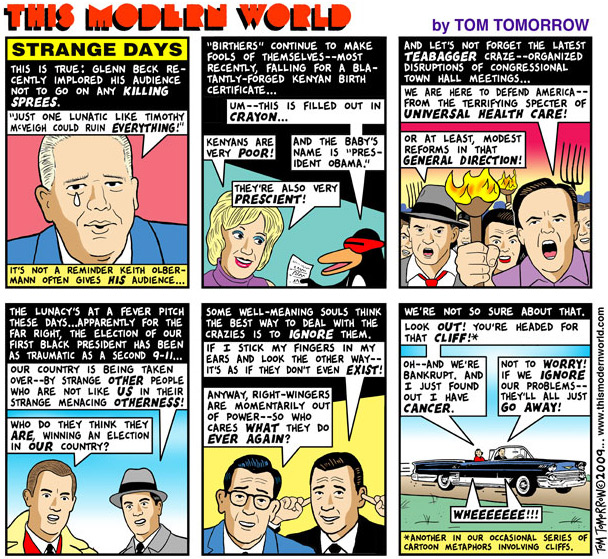The time has come to realize that the old habits, the old arguments, are irrelevant to the challenges faced by our people. They lead nations to act in opposition to the very goals that they claim to pursue — and to vote, often in this body, against the interests of their own people. They build up walls between us and the future that our people seek, and the time has come for those walls to come down. Together, we must build new coalitions that bridge old divides — coalitions of different faiths and creeds; of north and south, east, west, black, white, and brown.
The choice is ours. We can be remembered as a generation that chose to drag the arguments of the 20th century into the 21st; that put off hard choices, refused to look ahead, failed to keep pace because we defined ourselves by what we were against instead of what we were for. Or we can be a generation that chooses to see the shoreline beyond the rough waters ahead; that comes together to serve the common interests of human beings, and finally gives meaning to the promise embedded in the name given to this institution: the United Nations. (President Barack Obama’s Speech to the United Nations)

Interestingly enough, there were 22 years in a row when I could have made the same speech (Okay, it would not have been rendered as eloquently as the President’s, but the content would have been similar.) The most disconcerting thing about this statement is that I was referring to the internal stakeholders of many hospitals. One of my favorite statements during those years because of all of the infighting was that “We are not the enemy.”
An enormous amount of energy is expended in almost every healthcare organization on internal power struggles. In many cases these struggles revolve around issues relating to money. Questions like “Should the radiologist or the cardiologist be permitted to perform one particular test?” Turf battles over procedures always seem to be part of the equation. Other struggles revolve around perceived power relating to whatever positions are held because someone wants more control of larger pieces of the budget.
Power, control, greed? All of these traits are part of the human experience, but when an organization expends much of its energy on these issues, the result is wasted time, wasted resources, wasted anguish, and, in many cases, lower quality outcomes.
Watching old movies of workers in factories during World War II have always fascinated me because we, as a country, had found a common enemy toward which we could focus our angst. The fact that health care never seemed to be able to embrace illness as the common enemy always created intrigue for me. Yes, we would rally and work together when emergencies hit, but the other daily activities became somewhat mundane and boring, and our instinct seemed to be to revert to power, control, and greed.
Maybe, just maybe, we could find a way to marshal the medical staff, employees, and administration, the volunteers, and patient families to work together every day in every way to create an actual healing environment where patients can be surrounded with the energy of love, kindness, respect, dignity, and healing. Maybe this environment could be the goal of every hospital executive, and they could begin and end each day by focusing on setting the example for the creation of a healing environment.



 If we, as a country, do not believe that we are paying for these patients in some real way, then we are not cognizant of how the system is being contorted in order to allow hospitals to remain solvent. When you hear individuals complain about the
If we, as a country, do not believe that we are paying for these patients in some real way, then we are not cognizant of how the system is being contorted in order to allow hospitals to remain solvent. When you hear individuals complain about the 


 The laws that address data breaches involve not only civil but also criminal penalties, and the individual laws of various states are most times very different. It doesn’t matter if your business is located in only one state. What matters is where your customers are from, and if they are a diverse group, you must comply with each
The laws that address data breaches involve not only civil but also criminal penalties, and the individual laws of various states are most times very different. It doesn’t matter if your business is located in only one state. What matters is where your customers are from, and if they are a diverse group, you must comply with each


